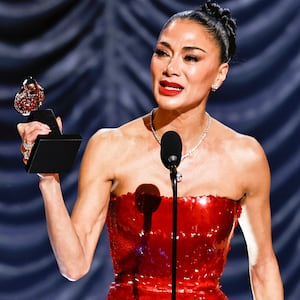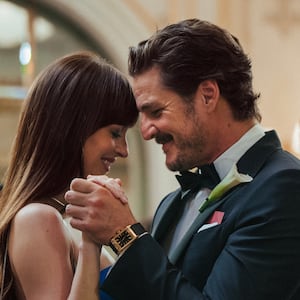The Yellow Brick Road is a well-traveled one.
Since Judy Garland donned the ruby slippers and first skipped down it in the 1939 film adaptation of L. Frank Baum’s novel The Wizard of Oz, countless performers have played different versions of Dorothy and embarked on a magical, profound journey. The legacy of the character and the impact it has had on the actresses who have played her is the subject of It’s Dorothy!, a new documentary that premiered at this year’s Tribeca Film Festival.
The film explores how, over the last 125 years, Dorothy has transcended being merely a storybook character, becoming a beacon for marginalized people in search of the safety and security of “home.”
We recently spoke with three of the actresses who have played different versions of Dorothy in recent productions: Shanice Shantay, who played Dorothy in 2015’s NBC production of The Wiz Live!; Nichelle Lewis who played the role in last year’s Broadway revival; and Danielle Hope, who won the televised BBC competition series Over the Rainbow in 2010 and played Dorothy in Andrew Lloyd Weber’s West End production of The Wizard of Oz.
What is it about the girl in blue gingham that is so timeless? The trio of performers talk us through the brain, heart, and courage beneath one of our culture’s most indelible icons.

Let’s start off at the beginning of the yellow brick road, so to speak. Could you all tell me what your first memory of Dorothy and The Wizard of Oz is?
Danielle: My first memory and experiences with Dorothy have to be sitting on my grandmother’s living room floor watching the movie. I think something that has always been so unique about The Wizard of Oz and Dorothy specifically is that it is such an accessible role, an accessible story for all ages. There aren’t many stories that can still continue to inspire. You can sit with my grandma, who was 96 when she passed, and to be able to sit with all those generations, with my sisters and my mother and my grandmother.
Nichelle: My experience is very similar. The first time I can think of ever watching the film was probably in my cousin’s house, just like sitting on the floor in his room, watching the TV and just being enthralled. I feel like for so many of us, we could all relate to Dorothy. And at the time, it was more of just this experience of like, oh, everything’s so magical. And look at her really cool friends. She has a lion. She’s got a tin man. I was just like, this is iconic.
Shanice: I remember watching The Wizard of Oz. I was really little and I couldn’t fully grasp it. I’m like, so was she just dreaming the whole time? I didn’t really understand the message behind it. And then I got cast as Addapearle in middle school in The Wiz. And so me and my dad, we watched the movie, and it was Diana Ross for me. I was just amazed with all the characters, all the actors, Michael Jackson, everyone in that movie.

When you were auditioning for your different productions of The Wizard of Oz and The Wiz, how much of those childhood memories were you carrying with you?
Shanice: For me it’s a cultural thing. The Wiz, that’s so big. That’s Black culture. You’re sitting on the shoulders of Stephanie Mills, Diana Ross, and all the girls who’ve just sung “Home” down. Jazmine Sullivan, everybody before. I remember my aunt saying before I went into the audition room, “Just be yourself.” Because there’s a million versions of Dorothy. I mean, it’s the most iconic role. There’s a million versions of how you play Dorothy. But she was like, just be yourself. I wanted to find a way to bring my true self into it.
Danielle: I was similar to Shanice. For me, that was going back to the original music and just coming back to the words and not trying to create a new version of something. Knowing that by me just taking a breath myself, it’s already different. It’s already my interpretation. I don’t need to change the notes, I don’t need to move the phrasing. For me, it was about simplicity and returning to the story and coming back to that. So that the pressure of filling the shoes as it were—the amount of times we’ve all probably heard that line—didn’t take over.
Nichelle: I was just like, this is gonna be so hard because I knew that I was stepping into some really big shoes. I had to try and just allow it to be, let the story be and just try to bring as much of myself into what it was, while also remembering the amazing, beautiful performances I saw before. And trying to just build the world so that people can relate to it the way that I did when I was younger.
I’m curious if you could all take me back to the moment for each of you, on the West End or on Broadway or before the cameras rolled on NBC, what it was like to look in the mirror and see yourself as Dorothy and know that you’re about to do something that a million girls dream of?
Shanice: This is how I feel when I step into a character. Shanice is gone, and she doesn’t come back til the last note. So what I really wanted to do was just step into that feeling. I knew what it was like to feel like Dorothy. I was away at college before I was cast, and was dying to be home again, dying to be back with my family. I knew what that felt like and I just wanted to fully submerge myself in her completely.
Oh that’s so Dorothy.
Shanice: I didn’t think about what it would mean at that moment to the culture. I didn’t think about the audience. I just wanted to really be Dorothy. And that’s a magical character. I feel like when you play her, a magic grows inside of you. Playing her, I grew so much as a person. I learned so much.
Nichelle: I wanted to just live in it. It was the most surreal moment, of course, like you’re getting ready to play Dorothy. It was just trying to stay present and stay in it and remember that nothing lasts forever. And that you only get to do this once. You only get to go on stage for the first time, the last time once.
Danielle: I got to play Dorothy in the London Palladium, which was one of the last places Judy Garland ever sang “Somewhere Over the Rainbow.” So my dressing room was called “The Judy Garland Suite.” We blocked the song exactly where Judy sat on the edge of the Palladium and did “Somewhere Over the Rainbow.”
Oh my gosh.
Danielle: So it was kind of difficult to escape all of the legacy, and I didn’t want to. So aside from being present and focused, and of course working with a live dog eight shows a week. And also trying to walk energetically hand in hand with everybody who has ever played Dorothy. So carrying that. Every night before I went on stage, and this sounds so lame, but I actually did it because it kind of zoned me in: I clicked my heels three times and sent a kiss off up into the Palladium and just said, “Thank you. Here we go.” And I wanted to carry that legacy and the memory of Judy too. Her presence in that building is very, very strong.
Kevin: One of the most fascinating aspects of the documentary, for me, was its exploration about how, throughout her career, Dorothy followed Judy Garland and how she acknowledged that. There was also this beautiful moment where Diana Ross talks about how doing The Wiz at that moment in her career was a huge turning point in her career. In your own careers, has Dorothy followed you in similar ways?
Nichelle: Dorothy is finding herself within the show. For me, I take that with me everywhere. I’m constantly finding myself, constantly trying to adjust to the new environments that I’m put in and that you can’t really control.
Shanice: Like I said, there is a magic that happens when you play this character. I remember one time I got really overwhelmed when I was singing “Home” and thinking about the lyrics. I’m like, maybe there’s a chance for me to go back there now that I know where I’m going. I thought about my career. I had a lot of time where I was out of the limelight, learning all the lessons. Dating for the first time, getting my heart broken for the first time.
I was 18 when I did The Wiz, when I played Dorothy. I really hadn’t lived yet. I was very sheltered growing up. I realized I’m at a point when I’m back in the game. My first movie for Netflix just aired last Christmas. I’m back in the industry in a big way and I know where I’m going now. I know who I am as a person. I’m in love with who I am as a person.

Danielle: One of the biggest things for me, for Dorothy, is not just finding yourself, but finding home. And the quest for what home means. I think for all of us, that word means something very different. And I have been able to create home wherever my two feet are in that moment.
Similar to Shanice, I was on the stage playing Dorothy when I was 18. I was on the television show when I was 17. The learning curve, from being in high school to being on live television every week, and then in the West End eight shows a week was one of the, is the steepest it will ever be.
Kevin: It’s rare for there to be a character like Dorothy who, for generations, has remained relevant and also stood up to so many different interpretations. What do you think it is about her that is both so malleable, but always maintains the crux of the character that everyone originally fell in love with?
Shanice: It’s Dorothy’s story. Everybody can relate to it. It’s no matter what race you are, no matter what religion, what sexuality. Dorothy is a story that everybody can relate to.
Danielle: Dorothy to me is the epitome of inclusion and curiosity. Leading with curiosity. Always, no matter who this character meets, she meets them with an open mind and open heart. I think that’s why Dorothy transcends generation after generation, because of her curiosity and ability to include everybody along her journey.
I’ve always found that really inspiring, the kindness in a situation that could potentially be dangerous. It’s terrifying. She has a very focused goal, right? She has somewhere to be. There are people that come along and instead of being like, sorry, no, and closing off, she stays open and curious. That’s something I’ve taken with through my entire life, inspired by Dorothy, and I think is a big part of why the story is still so relevant and so beloved.









